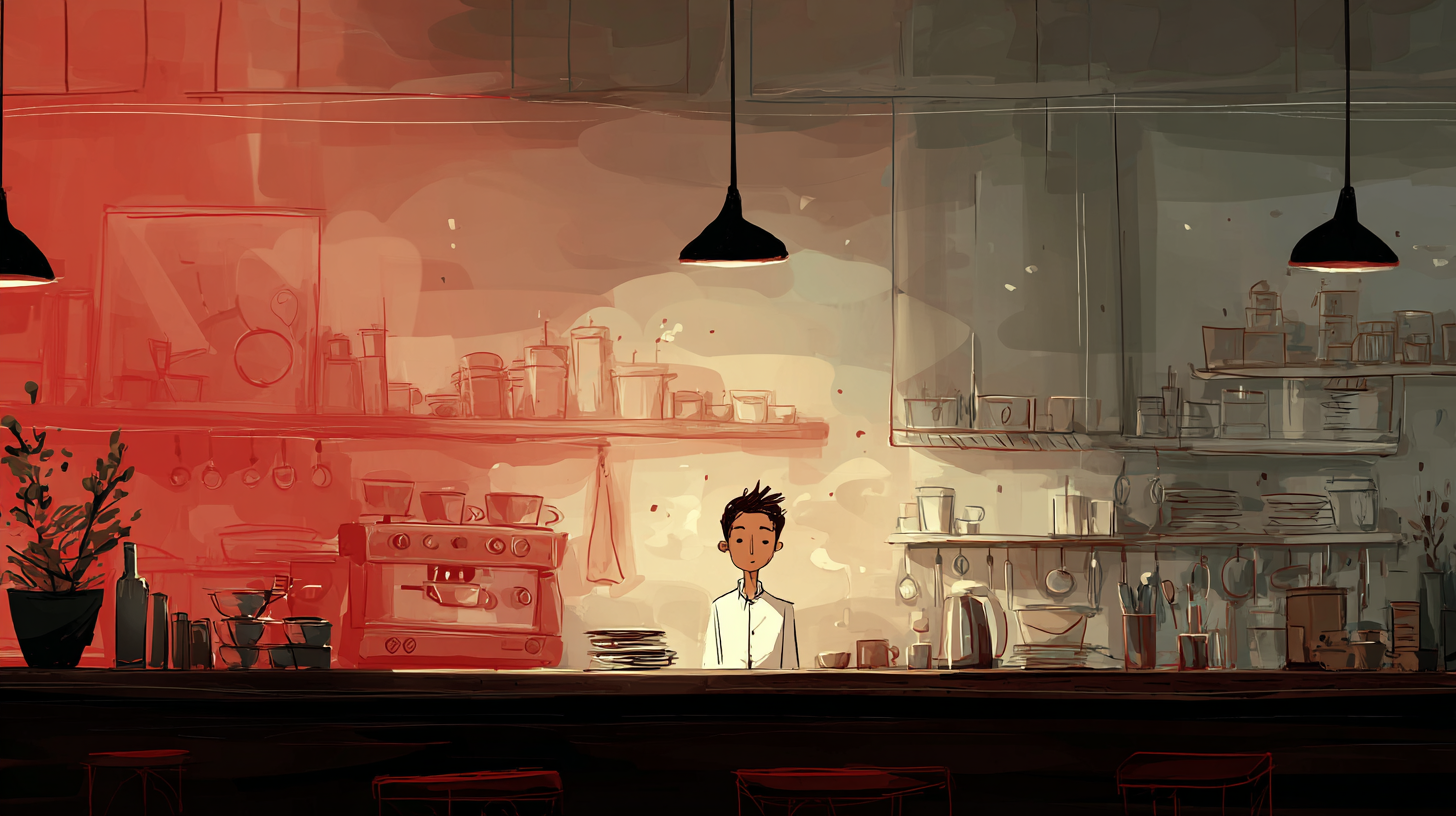“Reality” means things that are really happening, not dreams or imagination.
「reality」は「本当に起こっていること」や「夢ではなく、実際のこと」という意味です。
以下は英単語 “reality” に関するストーリー型学習コンテンツです。まずは大枠の意味を理解して最後の文章で確認しましょう。
主な意味(main meaning)
| 品詞 | 意味 | 発音記号 | 英語例文 |
|---|---|---|---|
| 名詞 | 現実、実在すること | /riˈæləti/ | He needs to face the reality of the situation. |
語源(etymology)
「reality」はラテン語の「realis(現実の)」から来ています。「実際にある」「本物である」というイメージが語源にあります。
類義語(synonyms)
| 類義語 | 英語例文 |
|---|---|
| truth | It’s time to accept the truth about his health. |
| fact | The fact is that we don’t have enough money. |
| actuality | In actuality, the plan didn’t work as expected. |
| existence | She questioned the existence of ghosts. |
| authenticity | The museum checked the authenticity of the painting. |
反義語(antonyms)
| 反義語 | 英語例文 |
|---|---|
| illusion | The magician created the illusion of a flying man. |
| fantasy | She lives in a world of fantasy. |
コロケーション(collocations)
| コロケーション | 英語例文 |
|---|---|
| harsh reality | He woke up to the harsh reality of unemployment. |
| face reality | It’s time to face reality and move on. |
| escape from reality | Some people watch movies to escape from reality. |
| in reality | In reality, things were much harder than we thought. |
| bring someone back to reality | The cold wind brought him back to reality. |
2項表現(binomials)
| 2項表現 | 英語例文 |
|---|---|
| hopes and reality | There’s often a gap between hopes and reality. |
| dreams and reality | She couldn’t tell the difference between dreams and reality. |
英語ストーリー(english story)
Title: Facing Reality at Work
Tom had always dreamed of becoming a famous chef. He watched cooking shows, read recipe books, and imagined himself in a big restaurant. However, after graduating from culinary school, he found himself working at a small café, making sandwiches and coffee.
At first, he thought it was just temporary. “I’ll move on soon,” he told himself. But after a year passed, he started to feel disappointed. One day, his friend Emma visited the café. “Tom, this place is nice,” she said. “But is this what you really wanted?”
That question brought Tom back to reality. He realized he had been living in a fantasy, not accepting the truth of his situation. The harsh reality was that becoming a famous chef was much harder than he had imagined.
Emma suggested he apply to a new restaurant that was opening downtown. “Face reality, but don’t give up on your dreams,” she said. With her help, he wrote a great resume and practiced for the interview.
Finally, he got the job. It wasn’t a top restaurant, but it was a good step forward. In actuality, he still had a long way to go, but he felt excited. The job was real, the challenges were real, and that was okay.
Tom learned that life is a mix of dreams and reality, and the most important thing is to keep moving forward.
和訳
タイトル:職場で現実と向き合う
トムはいつも有名なシェフになることを夢見ていました。料理番組を見たり、レシピ本を読んだり、大きなレストランで働いている自分を想像したりしていたのです。しかし料理学校を卒業した後、彼は小さなカフェでサンドイッチとコーヒーを作る仕事に就きました。
最初は「一時的なことだ」と思っていました。「すぐに別の所へ行くさ」と自分に言い聞かせていたのです。でも1年が過ぎると、だんだん失望を感じるようになりました。ある日、友人のエマがカフェを訪れました。「トム、このお店いいね」と彼女は言いました。「でも本当にやりたかったことってこれなの?」
その一言がトムを**reality(現実)に引き戻しました。彼は、自分がfantasy(空想)の中で生きていて、状況のtruth(真実)**を受け入れていなかったことに気づきました。**harsh reality(厳しい現実)**は、有名なシェフになるのは想像以上に難しいということでした。
エマは、彼に新しくオープンするレストランに応募することを勧めました。「Face reality(現実と向き合って)、でも夢はあきらめないで」と彼女は言いました。エマの助けで、彼は素晴らしい履歴書を作成し、面接の練習もしました。
ついに、彼はその仕事に就くことができました。それは一流レストランではありませんでしたが、前に進むための良い一歩でした。**actuality(実際)**には、まだ道のりは長いけれど、彼はワクワクしていました。仕事も、困難も、すべてが本物で、それでいいと思えました。
トムは、人生は**dreams and reality(夢と現実)**の混ざったもので、一番大事なのは前に進み続けることだと学んだのです。
Q&A
「reality」と「truth」の違いは?
「reality(現実)」は実際に起きていることや状態を指します。一方、「truth(真実)」は「正しいこと」「うそではないこと」に焦点があります。
例:
- 「reality」→ 彼が無職であるという現実
- 「truth」→ 彼が無職であるという事実(うそを隠していた可能性も含む)
「reality」と「fact」の違いは?
「fact(事実)」は、証明された情報やデータを指し、「現実」として成立しているものです。「reality」はもっと広く、主観的な体験も含む「実際の状態」に使います。
例:
- 「reality」→ 実際に毎日残業している状況
- 「fact」→ 昨日5時間残業したという記録された事実
「reality」と「actuality」の違いは?
「actuality(現実、実情)」はフォーマルな言い方で、「思っていたこと」と「本当のこと」の違いを説明するときに使います。「reality」はもっと日常的に使われます。
例:
- 「reality」→ 現実は甘くない(一般的な言い回し)
- 「actuality」→ 実際にはその計画はうまくいかなかった(フォーマル)
「reality」と「existence」の違いは?
「existence(存在)」は「何かが存在している」ということを表します。「reality」は、その存在がどういう状態か、という側面まで含みます。
例:
- 「existence」→ 幽霊の存在
- 「reality」→ 幽霊が本当に存在しているかどうかの現実
「reality」と「authenticity」の違いは?
「authenticity(本物であること)」は、物や情報が「偽物ではない」「本物である」と確認されることに使われます。「reality」はその物や状況が実際に存在するかどうかに使います。
例:
- 「authenticity」→ 絵画が本物かどうか
- 「reality」→ その絵が実際にそこにあるか、という現実
「reality」と「illusion」の違いは?
「illusion(幻想)」は、目には見えていても実際には存在しないものや、誤った認識を指します。「reality」は、幻想ではない、本当に存在するものです。
例:
- 「illusion」→ 魔法のように見えるが存在しないもの
- 「reality」→ それが実際にあるかどうか
「reality」と「fantasy」の違いは?
「fantasy(空想)」は、完全に想像上のもので、現実には存在しないことを指します。「reality」はその反対で、実際に存在する・起こっていることを指します。
例:
- 「fantasy」→ 空を飛べると思うこと
- 「reality」→ 空は飛べないという現実
「harsh reality」はどんな意味?
「harsh reality」は「つらい現実」「受け入れにくい現実」という意味です。夢や期待と違って厳しい状況を表す時に使います。
例:仕事が見つからない、計画が失敗するなど。
「escape from reality」はどう違う?
これは「現実から逃れる」という意味で、つらい状況やストレスから一時的に気をそらすことを指します。映画やゲームなどがその手段になります。
「in reality」とは?
これは「実際には」という意味で、予想や見かけと違って、本当はこうだという時に使います。
例:「彼は楽しそうに見えたが、in reality とても疲れていた。」



コメント